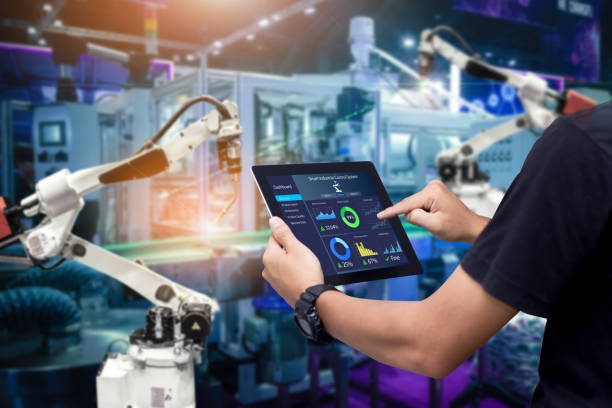In the dynamic landscape of Nigeria’s economy, the role of manufacturing stands as a pivotal force shaping its trajectory. This blog explores the significance of building a robust manufacturing sector for a stronger tomorrow. We’ll delve into the current state of manufacturing, its historical evolution, and why investments in this sector are crucial for Nigeria’s economic prosperity.
The manufacturing sector in Nigeria plays a vital role in contributing to the nation’s GDP and providing employment opportunities. Understanding its current status sets the stage for comprehending the potential impact of strategic investments.
Manufacturing goes beyond just production; it serves as a catalyst for overall economic development. From fostering innovation to creating value-added products, the manufacturing sector plays a pivotal role in driving sustainable growth.
Stay tuned as we journey through the historical perspective of manufacturing in Nigeria, examining past investments and their influence on the industry’s evolution.
Historical Perspective
A.Evolution of Manufacturing in Nigeria
To appreciate the current state of manufacturing, we must trace its roots. Nigeria’s manufacturing sector has undergone a notable evolution, from its early stages to the present day. Exploring the historical context provides valuable insights into the sector’s resilience and adaptability.
B.Past Investments and Their Impact
Examining previous investments in manufacturing allows us to gauge their efficacy in shaping the industry. Whether through government initiatives or private enterprises, understanding the impact of past investments helps identify patterns of success and areas that require renewed focus.
As we unravel the historical tapestry of Nigeria’s manufacturing journey, we gain valuable perspective on the challenges overcome and the lessons learned. This historical context sets the stage for comprehending the current challenges faced by the manufacturing sector in Nigeria.
Current Challenges
A.Identifying Obstacles to Manufacturing Growth
Despite its historical resilience, the manufacturing sector in Nigeria faces a myriad of challenges that hinder its optimal growth. These obstacles range from infrastructural deficiencies to regulatory complexities. By identifying these impediments, we can develop targeted strategies to address and overcome them.
B.How These Challenges Affect the Economy
The repercussions of manufacturing challenges extend beyond the sector itself, impacting the broader economy. From job creation to foreign investment, understanding the ripple effects of these challenges is crucial for formulating comprehensive solutions. In the next sections, we’ll explore why overcoming these hurdles is not only beneficial for the manufacturing sector but imperative for Nigeria’s economic well-being.
The Case for Investments
A.Economic Benefits of Manufacturing Investments
Investing in the manufacturing sector yields substantial economic benefits. It acts as a catalyst for economic growth by boosting production capacities and contributing significantly to the national GDP. Increased investments can lead to the development of a more diverse and resilient economy.
B.Job Creation and Poverty Reduction
One of the direct outcomes of robust manufacturing investments is the creation of employment opportunities. As factories expand and new ventures emerge, the demand for a skilled workforce rises. This, in turn, contributes to poverty reduction by providing stable incomes and improving the overall standard of living for a broader segment of the population.
In the following sections, we’ll delve into real-world success stories, highlighting examples of impactful manufacturing ventures in Nigeria. These stories not only showcase the potential of strategic investments but also offer valuable lessons for future initiatives.
Government Initiatives
A.Overview of Existing Policies Supporting Manufacturing
Governments play a pivotal role in shaping the manufacturing landscape through policy frameworks. An examination of existing policies aimed at supporting the manufacturing sector provides insights into the level of commitment and direction. From tax incentives to regulatory reforms, understanding these initiatives is crucial for assessing the government’s role in fostering a conducive environment.
B.Evaluation of Their Effectiveness
While policies may exist, their impact is measured by their effectiveness in addressing the sector’s challenges. A critical analysis of how well these initiatives have performed sheds light on areas requiring refinement or expansion. This evaluation is key to shaping future policy decisions that can further stimulate manufacturing growth.
As we progress, we’ll explore opportunities for growth and delve into the role of technology and innovation in modernising the manufacturing sector, paving the way for a more competitive and sustainable future.
Opportunities for Growth
A.Identifying Key Sectors with Growth Potential
Unlocking the full potential of manufacturing in Nigeria requires a strategic focus on sectors with inherent growth opportunities. Whether it’s in agro-processing, technology, or renewable energy, pinpointing these key areas allows for targeted investments that can yield significant returns. Understanding the specific sectors poised for growth is essential for directing resources effectively.
B.Encouraging Foreign and Domestic Investments
Creating an environment conducive to investments, both from domestic and foreign sources, is paramount. In this section, we’ll explore strategies to attract investors, ranging from policy adjustments to infrastructure development. Fostering a collaborative approach between the public and private sectors can further amplify the impact of these investments, propelling Nigeria’s manufacturing sector towards sustained growth.
Stay tuned for the upcoming sections where we’ll delve into the role of technology and innovation, as well as the importance of sustainability in manufacturing for a holistic approach to industry development.
Technology and Innovation

A.Role of Technology in Modernising the Manufacturing Sector
In the quest for a stronger tomorrow, embracing technological advancements is imperative. The integration of modern technologies, such as automation and data analytics, can enhance efficiency and productivity in manufacturing. This not only positions Nigerian industries on a global competitive scale but also fosters innovation and adaptation to evolving market demands.
B.Potential Impact on Efficiency and Competitiveness
Technological adoption has a direct correlation with improved efficiency and competitiveness. By streamlining processes and incorporating smart manufacturing practices, Nigerian industries can reduce costs, minimise waste, and deliver high-quality products. Exploring the potential impact of technology lays the foundation for a manufacturing sector that is agile, responsive, and well-positioned for sustained success.
In the following sections, we’ll delve into the crucial aspect of sustainability in manufacturing, addressing environmental and social considerations for a well-rounded approach to industry development.
Sustainability in Manufacturing
A.Importance of Adopting Sustainable Practices
As Nigeria strives for a stronger tomorrow, the adoption of sustainable manufacturing practices becomes paramount. Sustainable manufacturing goes beyond economic benefits, emphasising environmental and social responsibility. By reducing the environmental footprint and promoting ethical practices, the manufacturing sector can contribute to a more sustainable and resilient economy.
B.Potential Environmental and Social Benefits
Exploring sustainable practices not only mitigates the environmental impact of manufacturing but also addresses social considerations. From reducing carbon emissions to promoting fair labour practices, a commitment to sustainability aligns the manufacturing sector with global expectations. This not only attracts conscientious consumers but also positions Nigeria as a responsible player in the international market.
As we conclude this exploration, the final section will provide a recap of key points and a compelling call to action, emphasising the collective responsibility to invest in and nurture Nigeria’s manufacturing potential.
Conclusion
In our journey through the landscape of manufacturing in Nigeria, we’ve explored its historical evolution, current challenges, and the compelling case for strategic investments. From government initiatives to technological advancements and sustainability considerations, each aspect contributes to the narrative of building a stronger tomorrow through a thriving manufacturing sector.
As we reflect on the insights gained, the path forward is clear. Nigeria’s manufacturing sector stands at a crucial juncture, presenting opportunities for growth, innovation, and sustainability. The call to action is not just for policymakers and investors but for every stakeholder, individuals, businesses, and communities, to actively contribute to the resurgence of Nigerian manufacturing.
By fostering a collaborative spirit, embracing technological advancements, and prioritising sustainability, we can collectively shape a manufacturing landscape that not only drives economic growth but also stands as a beacon of resilience and progress for generations to come.
Thank you for joining us on this exploration of “Building a Stronger Tomorrow: Why Manufacturing Investments Matter in Nigeria.” Together, let’s embark on the journey to transform challenges into opportunities and sow the seeds for a prosperous and resilient future.












